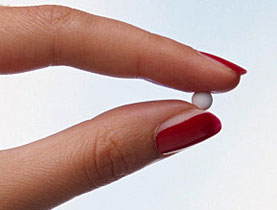
Morning-after pill highlights education needs

Demand for the morning-after pill has risen tenfold since the emergency option for preventing pregnancy has become available over the counter in Switzerland.
In line with the increase in popularity – from 8,000 units sold in pharmacies in 2002 to 93,500 in 2008 – both family planners and pharmacists warn that more education is needed to ensure it does not lead to people taking more risks in sex.
The emergency contraceptive pill was downgraded from a prescription drug in 2002, with pharmacists allowed to dispense it after interviewing potential customers.
Marcel Wyler, spokesman for Pharmasuisse, the Swiss society of pharmacists, says there has been a natural growth in demand over the years as the pill – previously only available from doctors and specialist hospitals – became easier to obtain.
“You have to take the pill within 24 hours [of having sex]. Very often it is needed during the weekend, when it can be very difficult to get from your doctor within 24 hours,” Wyler told swissinfo.
“That’s why the market didn’t actually exist before. That’s why before 2002 there were 8,000 to 10,000 sales a year.”
“Problem”
The pill cannot be advertised so the only publicity it gets is media coverage.
“After every bit of coverage in the media we realised that there were people asking for the pill in pharmacies, and that is a bit of a problem,” said Wyler.
“We try to keep this information away from the media to avoid people just using the product because they wanted to try it. It’s a good product for emergencies but it shouldn’t be the usual protection. It doesn’t protect against AIDS for instance.”
Wyler says that although women are given enough information about the pill during their interview with a pharmacist, more education is needed about the risk of sexually transmitted diseases and how extra protection should be used during sex.
“There should be more information about the risk of AIDS because people tend to underestimate the risk of AIDS and this underestimation is growing rapidly. I think that is one of the huge risks for young women and young people who don’t have steady relationships,” he said.
Protection
Susanne Rohner of PLANeS, the umbrella organisation of all the family planning centres in Switzerland, said they had supported making the pill widely available to women in 2002.
“Access is important. But the best thing would be to think about it beforehand. We have to work on that. If you don’t protect yourself against pregnancy, you also don’t protect yourself against other diseases.”
PLANeS say sex education varies wildly across Swiss cantons and they are calling for universal access to information for young people.
“In Switzerland not every child has sexual education. For example in canton Valais every child has sexual education but in other cantons it depends on the teacher, the village or the town,” she said.
“Nowadays everyone talks about sex but it is clear that not many young people know about it in any detail. How can young people protect themselves? They have to have the knowledge to be able to deal with it.”
swissinfo, Jessica Dacey
NorLevo, the emergency contraceptive pill available in Switzerland, contains levonorgestrel, a female hormone progestogen that can prevent pregnancy. The pill prevents ovulation or fertilisation and possibly post-fertilisation implantation of an embryo.
Emergency contraceptive pills may contain higher doses of the same hormones found in regular combined oral contraceptive pills. Taken after unprotected sexual intercourse, such higher doses may prevent pregnancy.
The pill is normally taken within 24 hours of having sex. Its effectiveness decreases to around 60 per cent between 48 and 72 hours.
When a woman wants to obtain the pill from a pharmacist she undergoes a 20-minute interview during which she is asked about her personal situation. The pharmacist attempts to fund the solution in each case.
Women are also informed about the issue of sexually transmitted disease. If they have been involved in casual sex, they are routinely sent to a disease-screening centre.

In compliance with the JTI standards
More: SWI swissinfo.ch certified by the Journalism Trust Initiative































You can find an overview of ongoing debates with our journalists here . Please join us!
If you want to start a conversation about a topic raised in this article or want to report factual errors, email us at english@swissinfo.ch.